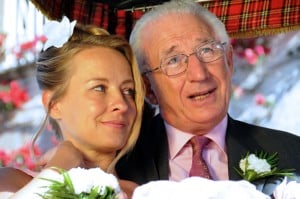I do a lot of estate planning for spouses, and one topic comes up over and over again. When I have clients who want to make life easier for their loved ones and avoid probate, the best way to do that is to use living trusts. The question, then becomes, should they have one, joint trust or separate trusts?
As with many things, the answer is: it depends. Doing one or the other is not generally right or wrong outside of the context of the particular parties whose estate plan I am doing. If parties ask me what I think, I would tend to recommend two trusts if I do not know anything about the couple, and the reason why gets into some sensitive issues.
As an estate planning attorney, I am not a marital counselor, or a divorce lawyer. I tend to believe that my clients are happily married and will stay happily married until death does them part, but statistics suggest that about half of all current marriages will end in divorce.
When I represent couples who are doing their estate planning, I am representing each of them together as a married couple. We are focusing on their futures, together, and making plans for when one of them passes on, assuming they will still be married when that happens.
The “key” estate planning addresses the time when both spouses have passed on, but a lot can happen in between the time we finish the estate planning and the day when the surviving spouse finally breathes his or her last breath. Divorce could happen; a surviving spouse might remarry; other things could happen as well that we do not anticipate.
Those uncertainties are no reason to delay or put off estate planning, but whether to have one, joint trust or two, separate trusts for a married couple has a lot to do with these potentially unanticipated possibilities. With that in mind, I will run down some ramifications and principles to keep in mind when deciding which way to go.
I should start by stating the obvious: with combined estates over $4M (in Illinois) and $5.45M (federal), two trusts are necessary in order to avoid estate taxes to the maximum extent possible. Estate tax kicks in at those state and federal thresholds. Whenever a married couple is approaching the $4M threshold (gross value), we should be doing estate tax planning, and that requires two, separate trusts. The rule of thumb is to spread the assets more or less equally between the two trusts to maximize the effectiveness of the estate tax planning. If your estate is well under that threshold, then you have a choice to make- one trust or two?

In addition, couples who have non-marital property likely need separate trusts. Non-marital property, generally, is property not acquired during the marriage as a result of the efforts of the spouse during marriage. Examples would be property brought in to the marriage that is not placed into joint ownership and property that is inherited (even during the marriage).
Separate trusts are an effective way to maintain non-marital assets separately as non-marital assets.
If non-marital property is transferred into a form of joint ownership, the law assumes that the spouse transferring the asset into joint ownership desires to make a “gift” of the non-marital property to the marital estate. With a joint trust, if everything goes into it, including non-marital property, it will all be considered marital property (unless a contrary intent is clearly expressed at the time of the transfer). Of course, a couple could make a conscious choice to commingle non-marital with marital property (making it all marital); in which case, a joint trust would not be an issue.
The ramifications of the difference between marital and non-marital property only apply in the context of a divorce. In the event of a divorce, marital property is divided up between the spouses, but non-marital property remains the sole property of the spouse who owns it.
To make things more complicated, the distinction between marital and non-marital property does not affect estate administration at all when a spouse dies. Different rules apply – the rules of descent and distribution (in the Probate Act) as modified by the estate planning documents.
Without a Will or Trust, the surviving spouse is entitled to half of everything the deceased spouse owned (if there are adult children). That is true even if the deceased spouse’s Will leaves nothing to the surviving spouse. A surviving spouse can renounce a Will and take his or her half, even if that was not the deceased spouse’s intent. With a trust, however, those rules to not apply. A surviving spouse has no right to renounce a trust.
On the other hand, it makes no difference whether property is held in trust or not in trust when it comes to determining whether property is marital or non-marital in a divorce. Separate ownership does not make marital property non-marital. If the property was acquired during the marriage as a result of the efforts of either spouse, it is marital property regardless of who owns it or how it is owned. These are all principles to keep in mind when doing estate planning.
When we do separate trusts for spouses, each spouse controls his and her trust, with some potential exceptions. Each spouse retains the right to amend his or her trust during life and after the death of the first spouse. This allows for maximum flexibility, which is generally considered a good thing in the estate planning world. But that flexibility may also frustrate the intent of the first spouse to die.
This is especially true in second marriage situations when one or both spouses have children from a prior marriage. Typically, each spouse desires to provide for their own children, which becomes complicated when there is some combination of children in common and children with other people. Most people are able to work out the details of how this will work, but there may be some concern that a surviving spouse will change what has been worked out.

We can actually deal with that, even with two trusts. We can allow the surviving spouse access to the funds in the trust of the first spouse to die only if the surviving spouse has insufficient assets in his/her own trust, and then any assets left when the second spouse dies are directed as the first spouse has instructed in the trust. In other words, we can tie some strings to the assets and control them to make sure that children from a prior marriage are not cut out.
Because we can control assets in a trust like that, most estate planning attorneys gravitate toward doing separate trusts for couples, but couples accustomed to holding everything in joint tenancy may be uncomfortable with having two separate trusts. Having two trusts requires splitting up assets between the trusts, except for the residence (as addressed below).
Having a joint trust will allow a couple to continue holding everything jointly. A joint trust will not allow estate tax planning, and it will not allow a spouse to keep inherited or other non-marital property separately, but, if estate taxes are not a concern and there is no non-marital property now (or expected in the future), then a joint trust might be appropriate.
At least three things should be considered, however, before doing a joint trust: 1) after the first spouse dies, a joint trust cannot generally be changed; 2) both spouses must jointly make all decisions about trust property; and 3) both spouses are required to make changes. The first two concerns can be addressed by drafting. We can expressly state that the trust can be amended after the first spouse dies. We can also expressly allow either spouse to act independently of the other spouse. Both spouses, however, will have to agree on any changes to the trust.
One exception to the separation of property when there are two trusts, is with the residence. A primary residence can be owned jointly in tenancy by the entirety in both trusts – only spouses can own property in tenancy by the entirety, and then only the primary residence can be owned that way. The advantage of tenancy by the entirety is that it protects the house from the creditors of only one spouse.
This is an advantage for married couples that protects the home from creditors. That advantage is lost, however, when there is a joint trust because the house in a joint trust will be subject to the creditors of either spouse. In fact, that is the chief drawback of a joint trust: it is subject to the creditors of both spouses. Having assets in separate trusts should protect the assets in one spouse’s trust from the creditors of the other spouse. Having all the assets in a single trust subjects all of the assets to the creditors of either spouse.
Generally, there are more advantages than disadvantages for couples to hold property in two, separate trusts than in a single, joint trust, but spouses accustomed to owning most everything jointly are often uncomfortable with that arrangement. It is also a layer of complication that spouses don’t want to deal with, because property must be divided between the two trusts. In the end, spouses should weigh the various ramifications and make informed decisions.


